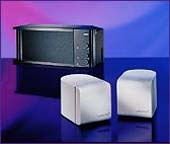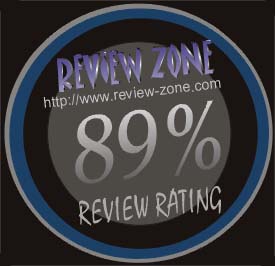| Acoustimass-3
Manufactuerd by Bose
Retail Price $399
Frequency Response: 20Hz - 20kHz
Satellite Power: 20W+20W
Subwoofer Power: 50W |

|
Well, the name Bose is no stranger to the speaker
industry. Their direct reflecting speakers are some of the best out there.
Now, with their Media Mate and Acoustimass-3 series, their product lineup
have been expanded to include speakers for PC users. So we selected the
Acoustimass-3 from their lineup to be included in our roundup. One thingís
for sure- if youíre not accustomed to Bose pricing, the $399 price tag
may come as a shock.
The Acoustimass speaker system is not specifically
designed as a computer speaker system alone,
but is a dual-purpose system of sorts. It may
be used with your home stereo system or with your computer. That means
there are no software utilities. However, the speakers do come with adequate
installation instructions and all the necessary cables. All the master
controls are located on the front
of the heavy 50W (RMS) subwoofer, and you can
access them quite easily if you place it on your desktop. On the other
hand, if you plan to keep it somewhere less accessible, the lack of remote
control may be irritating at times. The two magnetically shielded satellites
(20W RMS each) are small (3x3x5 inches) and blend well on your desktop.
Well, these are Bose speakers. When we tested
them, quite a few of us were almost expecting them
to blow the competition straight out of the water.
To a certain extent, they did. The speakers are compact, but they are incredibly
powerful. Stereo imaging is virtually perfect and very articulate.
Movie dialogue was crisp and clear on the Star
Trek: First Contact DVD, explosions and gunfire in Half-Life & Quake
II have to be heard to be believed. The A3D 2.0 sound effects in Half-Life
really came alive, making all the gamers want to immediately play the game
all over again with these speakers.

|
(Of course, we had to stop them- reviews gotta
get written around here) But- and there is always a but- when it was time
to test digital audio, we found that though the mid-range frequencies were
very strong, the overall sound quality at high volumes was not exactly
all we would expect from
a four hundred dollar system. In the end, the
majority of us came to the conclusion that this system would have been
a much better buy if it were priced at least between $300 and $350. At
virtually $400 and without any software features or control utilities to
make it especially attractive to computer users, we didnít think this would
have been a suitable option for most people. |
|

